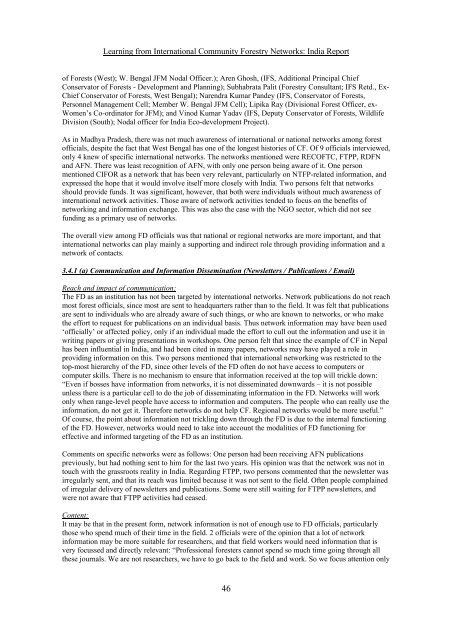Snapshots of International Community Forestry Networks: Country ...
Snapshots of International Community Forestry Networks: Country ...
Snapshots of International Community Forestry Networks: Country ...
Create successful ePaper yourself
Turn your PDF publications into a flip-book with our unique Google optimized e-Paper software.
Learning from <strong>International</strong> <strong>Community</strong> <strong>Forestry</strong> <strong>Networks</strong>: India Report<br />
<strong>of</strong> Forests (West); W. Bengal JFM Nodal Officer.); Aren Ghosh, (IFS, Additional Principal Chief<br />
Conservator <strong>of</strong> Forests - Development and Planning); Subhabrata Palit (<strong>Forestry</strong> Consultant; IFS Retd., Ex-<br />
Chief Conservator <strong>of</strong> Forests, West Bengal); Narendra Kumar Pandey (IFS, Conservator <strong>of</strong> Forests,<br />
Personnel Management Cell; Member W. Bengal JFM Cell); Lipika Ray (Divisional Forest Officer, ex-<br />
Women’s Co-ordinator for JFM); and Vinod Kumar Yadav (IFS, Deputy Conservator <strong>of</strong> Forests, Wildlife<br />
Division (South); Nodal <strong>of</strong>ficer for India Eco-development Project).<br />
As in Madhya Pradesh, there was not much awareness <strong>of</strong> international or national networks among forest<br />
<strong>of</strong>ficials, despite the fact that West Bengal has one <strong>of</strong> the longest histories <strong>of</strong> CF. Of 9 <strong>of</strong>ficials interviewed,<br />
only 4 knew <strong>of</strong> specific international networks. The networks mentioned were RECOFTC, FTPP, RDFN<br />
and AFN. There was least recognition <strong>of</strong> AFN, with only one person being aware <strong>of</strong> it. One person<br />
mentioned CIFOR as a network that has been very relevant, particularly on NTFP-related information, and<br />
expressed the hope that it would involve itself more closely with India. Two persons felt that networks<br />
should provide funds. It was significant, however, that both were individuals without much awareness <strong>of</strong><br />
international network activities. Those aware <strong>of</strong> network activities tended to focus on the benefits <strong>of</strong><br />
networking and information exchange. This was also the case with the NGO sector, which did not see<br />
funding as a primary use <strong>of</strong> networks.<br />
The overall view among FD <strong>of</strong>ficials was that national or regional networks are more important, and that<br />
international networks can play mainly a supporting and indirect role through providing information and a<br />
network <strong>of</strong> contacts.<br />
3.4.1 (a) Communication and Information Dissemination (Newsletters / Publications / Email)<br />
Reach and impact <strong>of</strong> communication:<br />
The FD as an institution has not been targeted by international networks. Network publications do not reach<br />
most forest <strong>of</strong>ficials, since most are sent to headquarters rather than to the field. It was felt that publications<br />
are sent to individuals who are already aware <strong>of</strong> such things, or who are known to networks, or who make<br />
the effort to request for publications on an individual basis. Thus network information may have been used<br />
‘<strong>of</strong>ficially’ or affected policy, only if an individual made the effort to cull out the information and use it in<br />
writing papers or giving presentations in workshops. One person felt that since the example <strong>of</strong> CF in Nepal<br />
has been influential in India, and had been cited in many papers, networks may have played a role in<br />
providing information on this. Two persons mentioned that international networking was restricted to the<br />
top-most hierarchy <strong>of</strong> the FD, since other levels <strong>of</strong> the FD <strong>of</strong>ten do not have access to computers or<br />
computer skills. There is no mechanism to ensure that information received at the top will trickle down:<br />
“Even if bosses have information from networks, it is not disseminated downwards – it is not possible<br />
unless there is a particular cell to do the job <strong>of</strong> disseminating information in the FD. <strong>Networks</strong> will work<br />
only when range-level people have access to information and computers. The people who can really use the<br />
information, do not get it. Therefore networks do not help CF. Regional networks would be more useful.”<br />
Of course, the point about information not trickling down through the FD is due to the internal functioning<br />
<strong>of</strong> the FD. However, networks would need to take into account the modalities <strong>of</strong> FD functioning for<br />
effective and informed targeting <strong>of</strong> the FD as an institution.<br />
Comments on specific networks were as follows: One person had been receiving AFN publications<br />
previously, but had nothing sent to him for the last two years. His opinion was that the network was not in<br />
touch with the grassroots reality in India. Regarding FTPP, two persons commented that the newsletter was<br />
irregularly sent, and that its reach was limited because it was not sent to the field. Often people complained<br />
<strong>of</strong> irregular delivery <strong>of</strong> newsletters and publications. Some were still waiting for FTPP newsletters, and<br />
were not aware that FTPP activities had ceased.<br />
Content:<br />
It may be that in the present form, network information is not <strong>of</strong> enough use to FD <strong>of</strong>ficials, particularly<br />
those who spend much <strong>of</strong> their time in the field. 2 <strong>of</strong>ficials were <strong>of</strong> the opinion that a lot <strong>of</strong> network<br />
information may be more suitable for researchers, and that field workers would need information that is<br />
very focussed and directly relevant: “Pr<strong>of</strong>essional foresters cannot spend so much time going through all<br />
these journals. We are not researchers, we have to go back to the field and work. So we focus attention only<br />
46

















![CynefinFramework final [Read-Only]](https://img.yumpu.com/19017304/1/190x135/cynefinframework-final-read-only.jpg?quality=85)